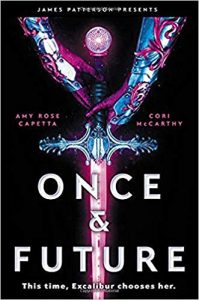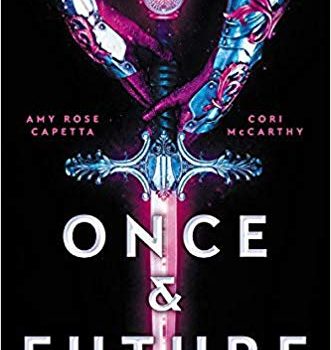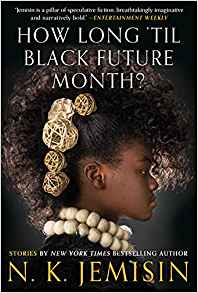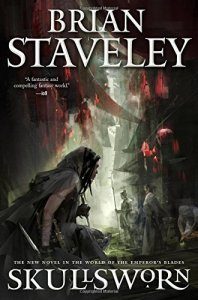Liz Bourke Reviews Once & Future by Amy Rose Capetta & Cori McCarthy
 Once & Future, Amy Rose Capetta & Cori McCarthy (Jimmy Patterson 978-0-316-44927-1, $18.99, 336pp, hc) March 2019.
Once & Future, Amy Rose Capetta & Cori McCarthy (Jimmy Patterson 978-0-316-44927-1, $18.99, 336pp, hc) March 2019.
Like Shakespeare, the Matter of Britain and the Arthurian mythos is a vein that speculative fiction has delved deeply into over the years – it could be said, too deeply. I’ve seldom seen an unapologetically Arthurian story – with an Arthur, a Merlin, and a Guinevere, all called by their Arthurian names or a very close analogue and occupying Arthurian roles – set in an unapologetically science fictional universe, though. And I can’t recall ever before seeing an Arthur story in a science fictional universe that saw your spaceships and interstellar corporations, and raised you Excalibur, magic, reincarnation, and fate.
That’s exactly what Once & Future, the first installment in a new duology co-written by partners Cori McCarthy (The Color of Rain, Now A Major Motion Picture) and Amy Rose Capetta (Echo After Echo, The Brilliant Death), does with its Arthurian retelling.
The Mercer Corporation controls most of space. It exercises a monopoly on nearly all essential goods, encourages a particularly toxic brand of unchecked capitalism, and has practically unchallenged political power. Everyone who deals with it has to speak its language – most other languages have died out.
Ari Helix is an accidental illegal immigrant from Ketch, the last planet to challenge Mercer’s domination. She was rescued by her adoptive parents from a wreck in space when she was very young and raised alongside her foster brother, Kay, until her adoptive parents were arrested by Mercer, and Ari and Kay found themselves on the run, alone. After a crash-landing on Earth in the course of evading the Mercer authorities, Ari finds herself in possession of a mysterious sword – a magic sword – and being followed around by a teenager who calls himself Merlin and who claims that she’s the latest in a long line of reincarnations of King Arthur. Merlin keeps trying to end the cycle, to finally get an Arthur who can unite humanity. So far, though, he’s seen some 50-odd Arthurs fail and die. Meanwhile, he’s been aging backwards. He’s discovering that it’s hard to be taken seriously as a teenager – a teenager who claims someone else has a great destiny.
Fortunately, Merlin has magic. Unfortunately for Ari, Kay, and Ari’s childhood sweetheart/infuriating friend Gwen – now queen of the independent medieval-knight-themepark planet Lionel, somewhat politically influential and therefore roped in when Ari and Kay are in desperate need of help – magic on its own doesn’t exactly even the odds against Ari’s survival, much less offer any guarantee that this time, Merlin’s attempt to guide an Arthur to the culmination of a great destiny will work out, especially not when Morgana – disembodied but bound to the same cycle of destiny as Merlin – also has magic, and hates Merlin with the bitter fire of a thousand burning suns.
Once & Future is a hell of a romp. Fast, fierce, gender-bending, and gleefully playful both with the conventions of science fiction and with the conventions of Arthurian retellings, it makes up for its flaws with sheer enthusiasm, and I recommend it for its joyful exuberance alone: KING ARTHUR IS A QUEER GIRL IN SPACE LET’S JOUST DRAGON-ANIMALS!
I said flaws. I really meant flaw, and that’s one that it shares with a large number of other YA SF/F novels. Its worldbuilding is fairly… well, the unkind word is broken… along technological and political axes. Its spaceships and space stations are set dressing, with little internal consistency to the ramifications of technological progress or the difficulties of being an outlaw with few resources in a panopticon society. Politically, it lacks a sense of complexity, any feeling of systems in motion – systems built by groups of people, with factions acting at cross-purposes and in awkward concert, with the depth, messiness, and weight of multiple competing needs experienced by any society that endures even so much as a decade beyond its founding. Its depth of field is shallow, its political structures reducible to individuals and simple symbols – a clapboard sort of set-building. I’m interested in logistics, in societies, in structures and processes, and I feel that a lack of a well-built social and political world does any story about kings, honour, and revolution a disservice.
Once & Future is a deeply fun novel, with compelling characters and an unusual take on the Matter of Britain. It’s got a kind of verve and wit and pace that makes it feel suitable for adaptation into visual media, and it shows the authors’ ability to give us fresh, gripping SFnal narratives. Despite its exuberance, I can’t help but feel that Once & Future doesn’t quite live up to its potential. All the same, I enjoyed it a lot. I’ll be really interested to see the sequel.
Liz Bourke is a cranky queer person who reads books. She holds a Ph.D in Classics from Trinity College, Dublin. Her first book, Sleeping With Monsters, a collection of reviews and criticism, is out now from Aqueduct Press. Find her at her blog, her Patreon, or Twitter. She supports the work of the Irish Refugee Council and the Abortion Rights Campaign.
This review and more like it in the February 2019 issue of Locus.
 While you are here, please take a moment to support Locus with a one-time or recurring donation. We rely on reader donations to keep the magazine and site going, and would like to keep the site paywall free, but WE NEED YOUR FINANCIAL SUPPORT to continue quality coverage of the science fiction and fantasy field.
While you are here, please take a moment to support Locus with a one-time or recurring donation. We rely on reader donations to keep the magazine and site going, and would like to keep the site paywall free, but WE NEED YOUR FINANCIAL SUPPORT to continue quality coverage of the science fiction and fantasy field.







